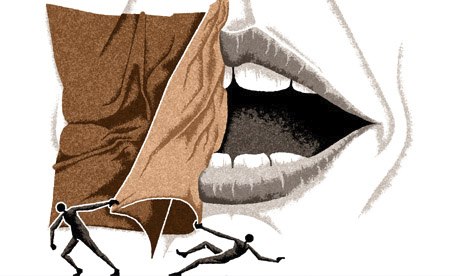The lobbying bill's attack on the right to campaign at a time of public disaffection could cause the biggest upset since 1651

Illustration by Matt Kenyon
On Tuesday night, in the
last hour of the working day and the final metaphorical hour of their
credibility, the government
agreed to pause the second part of its lobbying bill. We have many reasons
to suspect this "pause", not least its newness. Like the "omnishambles" and the
"rebuke
by a statistical authority", I don't remember anyone "pausing" before 2010.
Looking at the pause
in action during the health and social care bill in 2011, it seems designed
to concede enough small, technical things to humiliate its key defenders and
bore everyone else into submission – while slipping in enough new, large things
to show the world who was in charge once the government hit play again.
Humiliation, shmumiliation! What doesn't unseat you makes you stronger.
Nonetheless, before we
write off this particular pause, it marks a significant victory for this week's
dry-sounding but firecrackingly page-turning report by the former Bishop of
Oxford: Non-party Campaigning Ahead of Elections. It read like a novel. From the
ex-bishop to the chief executive of Mumsnet, from the TaxPayers' Alliance to
Amnesty International, from the joint select committee on human rights, through
the … well, all the relevant committees, they rose as one, channelling the
outrage of Joan of Arc through the baffled derision of (Elizabethan era) Blackadder.
Why was this bill presented to parliament with only two working days to read it? In a massive, unprecedented shake-up of charities, why were no charities consulted? Why did Nick Clegg claim that the "parts on third-party campaigning were discussed extensively by the three parties in the cross-party funded talks" when nobody else can remember this extensive discussion, and one Labour MP, John Denham, suggested rather that they were "never raised, never proposed and never discussed"?
And the most obvious, pressing point belongs to Juliet Swann of the Electoral Reform Society in Scotland: "What are they trying to prevent? What terrible thing has happened that they think this will stop from happening in the future? … Why are they trying to fix a hypothetical situation that you can't give me any examples of?"
As little light as any of us can shine on the tearing up of due process and the inside of Clegg's troubled mind, I believe I can help with the "hypothetical" situation that this regulation seeks to fix. The government is attacking charities because it is terrified of them, and this is for a very good reason.
A few statistics have been
plaguing MPs for some time. The National Trust has four million paying members;
38 Degrees has 1.9 million
(we don't have to pay subs but sometimes do anyway); many animal or wildlife
charities boast 500,000 members. Membership of political parties, meanwhile, has
fallen to 1%, or under 500,000 (in the three main parties combined). This means
there are more people who care about birds than who can get meaningfully
exercised about the victory of any particular candidate. If MPs are anxious
about the impact a charity could have with a campaign they are dead right to be:
just one petition from 38 Degrees could decimate a candidate's chances for
years.
This has come to fixate the
Commons – the idea that "other political or campaigning organisations … are
competing with parties for members" (House
of Commons Library, 2012). Is the National Trust seriously drawing away the
Tory hardcore? Or is it possible that many people, beyond Russell Brand, think that
if a conventional politician is the answer, you have asked a really weird
question? Do people need some other outlet for their civic spirit and sense of
exuberant possibility?
Rather than asking these
questions, politicians have determined that they can stave off this threat to
their power by bringing down the third sector. Hubris combined with – in the
kindest possible light – not giving themselves enough thinking time has resulted
in a suggestion that, were charities sincerely to mobilise their supporters
against it, it would fuel the closest thing we've seen to a revolution since 1651.
No doubt in some blue-sky
meeting, some sunny morning before Steve
Hilton left, when everyone was still allowed to wear sandals and think of
ways to turn the UK into a teeny, cut-price America, this seemed like a good
idea: why do charities have to stick their oar in? Why can't they keep to what
they're good at, delivering services we should be delivering – for free? Why
can't we ask for some third-sector neutrality? You don't see Barack Obama
getting his chain yanked by Child Poverty Action Group.
Guardian